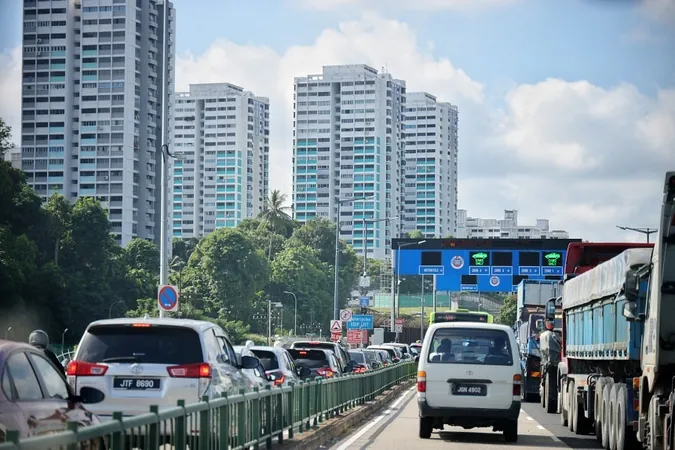
Johor's Youth Flee for Higher Pay in Singapore: Can the New Economic Zones Halt the Brain Drain?
2024-10-23
Author: Ming
Johor's Youth Flee for Higher Pay in Singapore
JOHOR BAHRU - The allure of higher salaries is driving many young professionals in Johor to seek employment across the border in Singapore.
Take the case of Ms. Nur Amira Jaaffar, who only a few months after graduating with a business administration degree in February, began working as an administrative clerk in Johor for a modest monthly salary of RM1,500 (S$455). Dissatisfied with her earnings, she made the leap to a housekeeping position in Singapore, where she now enjoys a salary of S$2,000, a remarkable increase that highlights the wage disparity between the two regions.
Despite the availability of jobs in Johor that align with her qualifications, Nur Amira explains that the starting salaries simply do not provide an incentive to remain. "It only makes more sense to work in Singapore," she told The Straits Times, emphasizing the burdensome daily commute from Senai, which is approximately 26km from the causeway, not accounting for the often congested traffic.
The Response from Johor Officials
Officials in Johor are acutely aware of this issue, recognizing that competitive wages are crucial for attracting and retaining local talent. Plans for the Johor-Singapore Special Economic Zone (JSSEZ) and the Special Financial Zone (SFZ) in Forest City aim to tackle this brain drain. The JSSEZ is envisioned as a hub for business and investment, expected to be finalized by the end of 2024.
Spanning 3,505 square kilometers, the JSSEZ will integrate various sectors, including data centers, technology parks, and manufacturing hubs, with major tech companies like Nvidia already making their move to establish operations. Moreover, Microsoft has plans for a data center in Kulai, a sign of confident investment into the Johor region.
Potential Wage Improvements
According to Mr. Natazha Harris, CEO of the state investment agency Invest Johor, prospective starting salaries in the JSSEZ could range from RM4,000 to RM7,000. While these figures still fall short of what one might earn in Singapore, the reduction in commuting time presents a compelling option for many.
Migration Trends
However, this isn't a one-way street. More than 300,000 Malaysians journey across the Johor-Singapore Causeway daily, drawn by salaries that can be triple what they might earn locally. This migration has resulted in significant labor shortages across various sectors in Johor, including food and beverage, hospitality, and healthcare. The state’s Chief Minister Onn Hafiz Ghazi has noted an alarming situation where only about 70% of the advertised job vacancies are filled.
Impact of Living Costs
Rising living costs further exacerbate the situation. Young workers like 20-year-old Sharon Lee, who earns RM3,000 a month selling premium streetwear in Johor Bahru, find that over 80% of their income goes to supporting their families and covering essential expenses. Statistics show that Johor's average household income stands at RM8,517 monthly, while expenditures average RM5,342, leaving many families grappling with financial pressures.
Inflation and Economic Conditions
Inflation continues to be a concern, with the Consumer Price Index in Johor rising 1.8% year-on-year, which, while slightly below the national average, remains troubling for buyers in a tightening economy. Local assemblyman Andrew Chen Kah Eng has pointed out that many families now aspire for their children to secure jobs in Singapore as a means to cope with escalating living costs.
Hopes for the Future
Amid these challenges, hopes are pinned on the JSSEZ and infrastructure developments like the Rapid Transit System Link, which could usher in new economic opportunities for local residents. This initiative is anticipated to generate broad benefits across numerous sectors, from services to tourism.
Encouraging Competitive Salaries
The state government is also in discussions with companies in the JSSEZ to encourage them to provide more competitive salaries, especially in burgeoning fields like fintech and artificial intelligence. A career fair set for November 1 to 3 will showcase job opportunities in various industries, with starting salaries projected around RM3,000.
Cautious Optimism
Industry leaders remain cautious, cautioning that while the JSSEZ and SFZ may enhance wage prospects, local businesses, traditionally reliant on multinational corporations within Kuala Lumpur, may struggle to keep pace with Singaporean pay scales. Mr. Teh Kee Sin, a manufacturing entrepreneur, underscores that many firms in Johor play supportive roles in the broader economic landscape, highlighting a necessary pivot towards high-skilled sectors such as financial services for future growth and salary improvement.

 Brasil (PT)
Brasil (PT)
 Canada (EN)
Canada (EN)
 Chile (ES)
Chile (ES)
 España (ES)
España (ES)
 France (FR)
France (FR)
 Hong Kong (EN)
Hong Kong (EN)
 Italia (IT)
Italia (IT)
 日本 (JA)
日本 (JA)
 Magyarország (HU)
Magyarország (HU)
 Norge (NO)
Norge (NO)
 Polska (PL)
Polska (PL)
 Schweiz (DE)
Schweiz (DE)
 Singapore (EN)
Singapore (EN)
 Sverige (SV)
Sverige (SV)
 Suomi (FI)
Suomi (FI)
 Türkiye (TR)
Türkiye (TR)